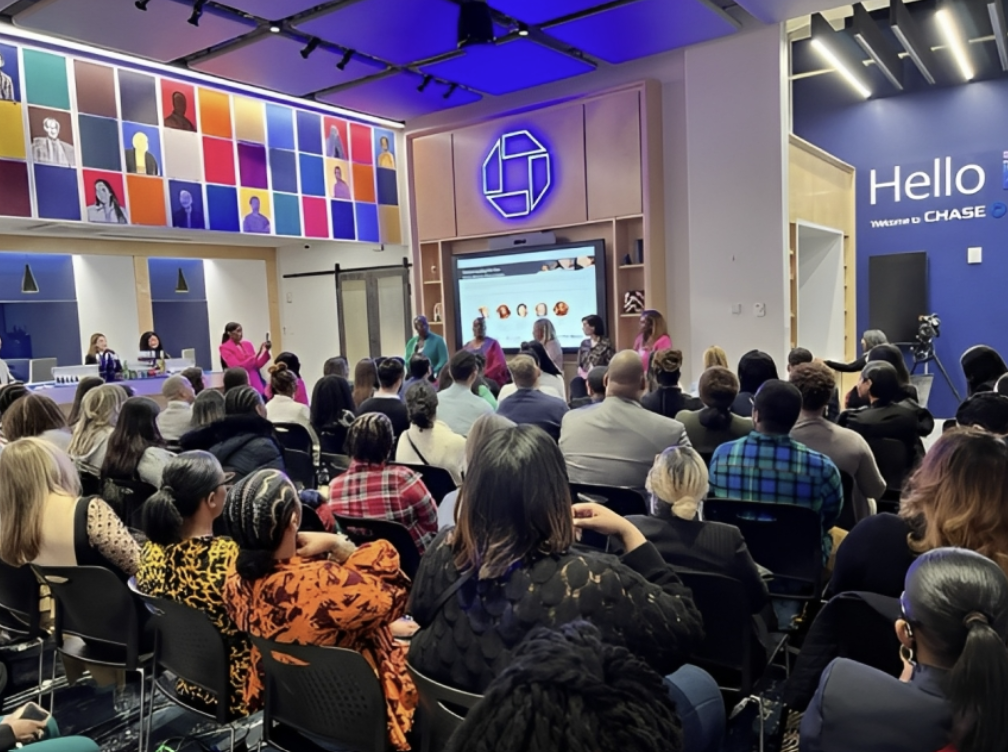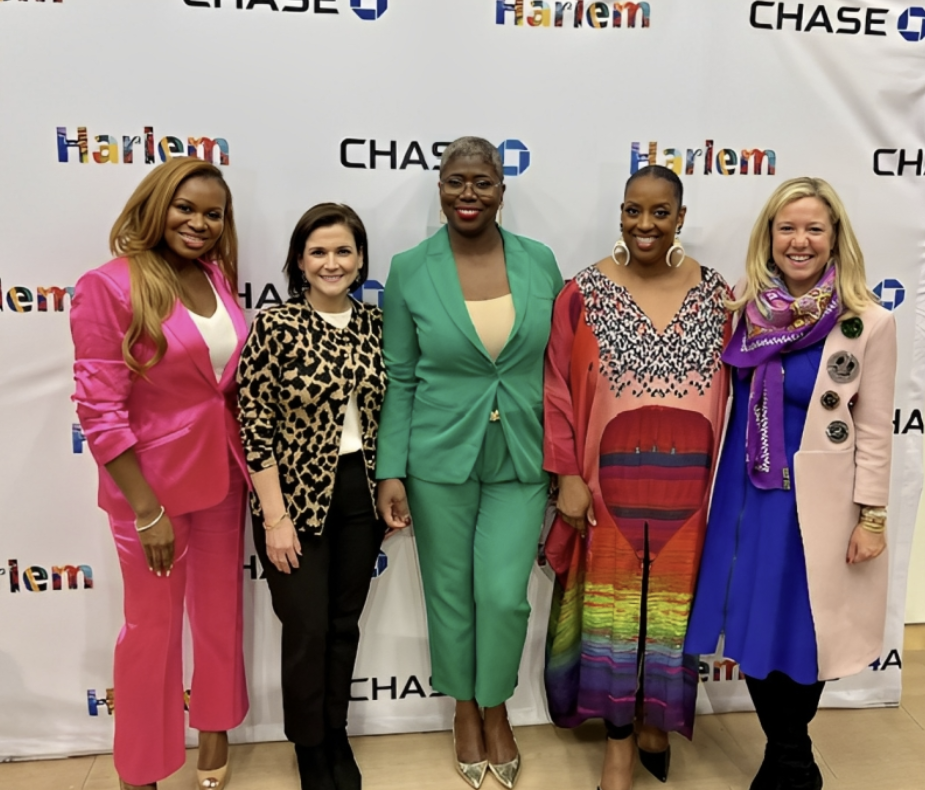by Derrel Jazz Johnson


In celebration of Women’s History Month, JPMorgan Chase put together an extraordinary panel of five fabulous women at a Chase branch in the heart of Harlem. The panel featured Harlem’s own born, bred, and buttered Melba Wilson, owner of Melba’s Restaurant, Carolina Jannicelli, Managing Director, Head of Community Impact, JPMorgan Chase, Nelle Miller, Managing Director Co-Head of New York Region, J.P. Morgan Private Bank, and Sandra Garcia, Founder, and Chief Marketing, Branding, and Diversity Strategist, Encounter Your Potential. The panel was moderated by the groundbreaking Nichol King, who is Executive Director, Community Banking, Northeast for JPMorgan Chase.
King asked the five women questions in front of a room of more than 125 people filled with mostly women for close to an hour. After the event, The Harlem Times spoke exclusively with all five women.
On the panel, Wilson discussed a meeting in Harlem with the man at the top of JPMorgan Chase and how it impacted her.
“Chase not only makes withdrawals, but they make large deposits in Harlem and in our communities,” Wilson explained. “I have witnessed our village’s peaks and valleys. There have been significant organizations that have come into the neighborhood and have made massive withdrawals while making menial deposits. About a year ago, I was one of four local business owners invited to sit down for an intimate and in-person conversation with the CEO of JPMorgan Chase, Jamie Dimon. King, whom we affectionately refer to as ‘Harlem’s Banker’ ushered me into my favorite branch of Chase, where Mr. Dimon, dressed in jeans and a casual pullover sweater, introduced himself and immediately asked what Chase could do to help small businesses and individuals in our community. I talked about the importance of being bankable so that when small business owners apply for loans, lines of credit, etc., they are accepted.”
Wilson continued to discuss the meeting with Dimon.
“I expressed the importance of ensuring that our community creates economic empowerment by providing a dollar which can then circulate at least eight times in our community and create generational wealth,” she recalled. “All of these require education and resources. I then presented him with a Melba’s Sweet Potato Pie, took a few pictures, and was on my way. I am here to tell you that Mr. Dimon heard and listened. I am sure it was not my conversation but the millions of dollars flowing to communities of color and the $30 billion commitment of JPMorgan Chase is their testimony to the call for action.”
“Black and Latina women are starting businesses at higher rates than any other cohort, but inequities persist when it comes to their accessing capital or the tools and networking they need to succeed,” she said. “We’re taking a holistic and multi-pronged approach to ensure that women and particularly women of color can grow their financial health and wealth. Initiatives like DigitalUndivided’s BREAKTHROUGH Program, sponsored by our Advancing Black Pathways program, provides founders with a deeper understanding of their customers, startup funding, growth marketing strategies, and networking opportunities to scale their ventures. More broadly, we’ve committed $350 million to grow Black, Latino, women-owned, and other underserved small businesses as part of our $30 billion Racial Equity Commitment to help address the racial wealth divide. We’re focused on developing talent through our careers and skills programs for employees at JPMorgan Chase and in our communities, including through investments in HBCUs and diverse colleges, universities, and workforce programs. We’re also investing in research, including through the JPMorgan Chase PolicyCenter and with partnerships like the Institute for Women’s Policy Research, to inform policy reform that drives more equitable access to opportunity.”
King talked about how her network of sisters continues to support and uplift her.
“As someone whose career centers on uplifting communities and empowering people, especially those in my beloved Harlem, I know that my personal and professional network is critical to my success,” she said. “While there are many people I can reach out to, call on for help and go to for inspiration, it is the women in my life who have made such a difference. Through their sisterhood, their leadership, and their advocacy, they have helped me understand my own power and responsibility and how I can then share that back out, with the community. Especially the young women in the community, who are our future leaders.”
King also discussed her joy with her work not only in Harlem but around the region.
“I’m proud to work for a firm like JPMorgan Chase that is breaking down barriers to lead with diversity, equity, and inclusion and one way we do that is through Women on the Move, the firm’s commitment to fuel women’s ambition and advance financial equality. Everything we do is geared toward helping women to reach their full economic potential and I can say with certainty, the future is bright.”
Miller discussed the importance of mentors and sponsors, citing their impact on her professional and personal life.
“Throughout my career, I have been lucky to have incredible mentors and sponsors at J.P. Morgan who have invested in me and given me opportunities to learn, grow, and succeed,” she said. “A mentor is someone that provides advice and support throughout your career and helps you open doors. A sponsor is someone that has the power to be your voice in the room and help you reach the next level. In my role as a leader, I have the opportunity to be that sponsor to many women and ensure that the people on my team feel supported and empowered to take on the next challenge and greater responsibilities.”
“Having different perspectives at the decision-making table not only helps us make more informed decisions but also leads to better outcomes and makes us more successful as a firm. I feel fortunate to work for a company like J.P. Morgan that promotes those values and is focused on actively supporting women and diverse talent.”
Finally, we asked Garcia to further discuss being a double minority, which she mentioned on the panel.
“My layers of intersectionality and dimensions of difference are actually more than double,” she said. “I am not only a woman and Black, but also Latina, a first generation, and English as my second language to name just a few more. Each dimension of difference has come with its own individual challenges and then layered together it can be compounded by feelings of insecurity, self-doubt, and inadequacy. Interestingly enough, my journey as a student helped me build defense mechanisms which I then have been able to master as a professional and adult. First and foremost, I have learned to accept my differences as an asset and not a liability. I have learned to use my differences as conversation starters and as ways to educate and inform about differences. Not all Hispanics look the same, and I am a perfect example of that. My own identity also had a lot of influence in my decision to become a full-time consultant working at the intersection of Marketing and diversity, equity, inclusion, and belonging! I use my lived experiences and intersectionality as teaching moments. My lived experiences influence my emphatic coaching and consulting style — it has impacted my leadership abilities and career as a superpower.”
It was an absolute honor to listen to these intelligent and accomplished women share their accomplishments, challenges, and personal journeys with the crowd. Though King is not a journalist, she asked insightful, thought-provoking questions to the four women. It was an honor meeting Jannicelli, who I conversed with before the event along with Wilson. Miller is assisting so many in career development. I discovered Garcia and I attended the same Harlem high school. My Harlem sister is the most supportive of her tribe, and I am honored to be a part of that.
To learn more and nominate other great women for future entries in the series, visit https://nyfabulousfive.com/.
